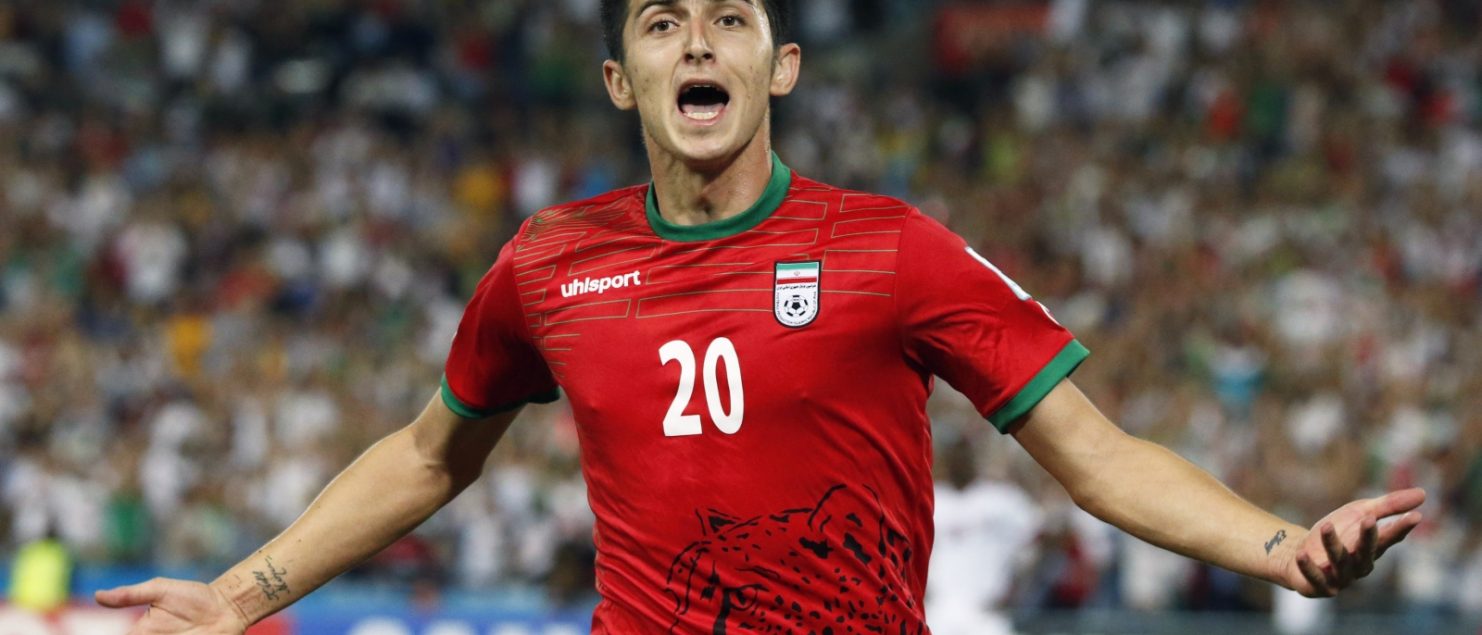Sardar Azmoun Retires from Iranian National Team
After facing abuse from fans online, Sardar Azmoun announced his retirement from the Iranian national team on his Instagram account this morning.
Less than three days after being narrowly eliminated from the World Cup in a 1-1 draw against Portugal, Iran’s 23-year-old center forward followed fellow Iranian striker Reza Ghoochannejhad in stepping down from national team duties. Azmoun blamed the attacks on his World Cup performances as being the reason his mother recently fell ill, and claimed he had retired to protect his mother’s health.
After scoring against Atlético Madrid and Bayern Munich, as well as his debut goal for Iran’s senior side, in November 2016, the hype grew around Azmoun’s name. Journalists began to dub him as the “Iranian Messi,” with many Iranians confident he would become the best Iranian footballer ever. He gained plaudits for his aerial ability, quickness, and technique, with many fans likening him to Zlatan Ibrahimović, and touting him as the heir to legendary Iran striker Ali Daei’s throne. After transferring to Rubin Kazan at the age of 17, he would become Iran’s youngest player to ever play in a foreign league. Needless to say, there was quite a heap of pressure on Azmoun’s young, albeit brawny shoulders.
On February 26, 2015, Azmoun signed with FC Rostov, then in a relegation battle, on a three-and-a-half month loan. Bit by bit, he would show glimpses of his talent, and rescued Rostov from relegation by scoring a crucial winner in the June play-offs.
He would return to Rostov on loan the following season, and they would bounce back from a dismal 2014/15, finishing two points away from first, but good enough to clinch a Champions League play-off spot. Rostov were seen as the “Russian Leicester,” but despite failing to meet the Foxes’ title capture, Rostov did themselves proud, and none shone brighter than Azmoun.
So impressive was the player that he would trigger a legal dispute between his two clubs the following summer. With Rubin Kazan wishing to bring him back, Rostov decided to trigger the buy out clause in Azmoun’s contract. Rubin Kazan denied the clause, claiming he was their player. In January 2017, FIFA repudiated appeals from Rubin that he was their player, ruling that Rostov had no outstanding obligations towards Rubin, and two months later, he scored a brace against Rubin. Such is the chaotic nature of Russian football, however, that he would return to Rubin Kazan the following season in a permanent transfer.
Prior to the World Cup, Azmoun had scored 23 goals in 31 caps, giving him the best goals-per-game ratio of any footballer in Iranian history. With his close control and heading ability, many were hoping for Azmoun to move to a bigger club after a breakthrough tournament, including Rubin, who wish to cash in on him. However, this World Cup was anything but promising for him.
Perhaps it was his inability to match up against the caliber of Morocco, Spain and Portugal. Perhaps it was the fact that Carlos Queiroz’s defensive, yet effective system doesn’t allow for much creative progress up top; Azmoun was forced to do it on his own often as Iran played many long balls. Perhaps it was the fact that he simply wasn’t ready, which may be due to the fact that he still plays in Russia, and not a more challenging league, at the age of 23.
His tournament couldn’t have started in a worse way, with Azmoun missing a golden chance to win it for Iran. In a game where many were hoping for him to make his mark, his heavy touch let him down time and time again, and his greediness didn’t help either. Iran eventually won, but severe doubts were already cast regarding the Iranian’s ability.
The second game, he would match up against Spain, in his home stadium of Kazan. He did slightly better, mostly feeding off scraps as Spain eventually found a late, dodgy winner from Diego Costa, but the performance failed to quell doubts on the player’s ability. After the loss, Azmoun revealed that he may leave the Iran team if fans are unhappy with his performances.
Iran fans attempted to reassure Azmoun by sending in messages of support ahead of the final, crucial group stage match against Portugal. Did they help? Perhaps.
Azmoun had his finest World Cup performance to date, linking up with Alireza Jahabaksh and creating danger on the transition, despite being hindered by poor decisions in the final third. Furthermore, he silenced those who criticized his workrate by putting in a tireless shift vs. Portugal. He marked William Carvalho out of the game, and even though he couldn’t get on the score sheet, what with being marked by Pepe, who won contested 15 aerial duels, the most of any player in a single game this tournament.
Still, after finishing the tournament on a good run of form, Azmoun retired today from national team duties. Of course, at 23, it may very well have been just an impulsive, temporary decision, and there is a chance he could be back for January’s Asian Cup, especially if the health of his mother improves. Iran fans will be hoping that he reverses his decision, and that both him and Jahabaksh move to top 5 leagues soon in order to polish their raw skills.
This time, they’ll know to stand behind him when times get tough.
By: Zach Lowy
Photo: Reuters
